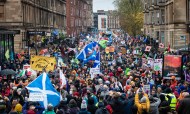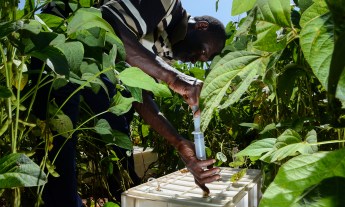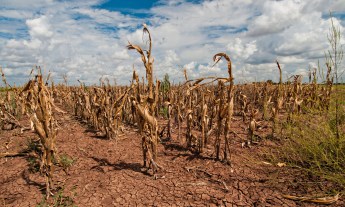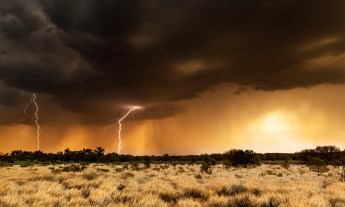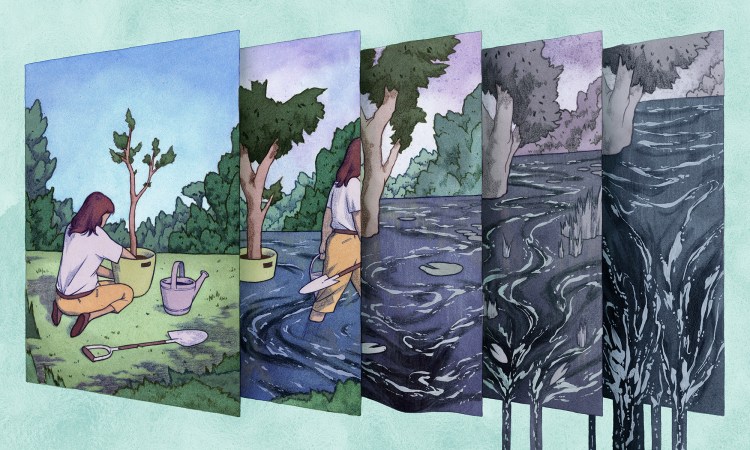
Some argue that we have a moral responsibility for future generations, but others ask: how do we know what they would want? Writer Charles C. Mann explores the confusing ethics of acting on global warming.
Every few years the Intergovernmental Panel on Climate Change (IPCC) issues a set of multivolume reports that attempt to portray the state of the science on climate change. In 2013, it put together a consensus projection of how sea level would be affected by a variety of factors, including the melting of glaciers in Greenland, the shrinking of the Arctic ice cap, and the fact that water expands as it gets warmer (the increase is slight, but it adds up when extended across the whole globe). Taken together, these would push up the sea roughly 28 inches by 2100. Antarctica, the biggest ice mass, would remain more or less intact, contributing only one to three inches to the total. This idea seemed borne out by the facts, but the IPCC also thought that scientists needed to look more closely, just to be sure.
Researchers Rob DeConto and David Pollard went on to perform that analysis, which was published in Nature in March 2016. They said there was a chance that Antarctica could fall apart by 2100, and therefore the seas could rise higher and faster than the IPCC imagined possible. “For a geophysicist, what’s going on is stunning,” DeConto told me. “We used to believe these systems needed thousands of years to make these shifts. Instead it’s happening so fast that it’s terrifying. Conceivably, you could start seeing truly bad effects in a hundred years.”
And this is one of the great difficulties in thinking about climate change: what seems terrifyingly fast on the geological scale is unfathomably long on the human scale. By “truly bad effects” DeConto meant flooded coasts, vanished islands, awful droughts and, maybe, storms of unprecedented power. But even if these occur in the time he fears — even if they transpire in the geologically insignificant span of a century — they will not be seen by him or me. Quite possibly, every person who reads these sentences will be dead before they occur, as will most of their children. How many governments make plans for such long-term contingencies? How many families do? How can we think about such long-range effects?
“The problems of climate change,” says the philosopher Dale Jamieson, “swamp the machinery of morality.”
By our actions today (burning fossil fuels), the argument is, we are dumping problems (drought, sea-level rise) on tomorrow. On the one hand, forcing other people to clean up our mess violates basic notions of fairness. On the other hand, actually preventing climate-change problems would require societies today to make investments, some costly, to benefit people in the faraway future. It’s like asking teenagers to save for their grandchildren’s retirement. Not many would do it. Would they be wrong? The harder one looks at the problem, the more confusing it seems. “The problems of climate change,” says the New York University philosopher Dale Jamieson, “swamp the machinery of morality.”
The basis for arguing for action on climate change is the belief that we have a moral responsibility to people in the future. But this is asking one group of people to make wrenching changes to help a completely different set of people to whom they have no tangible connection. Indeed, this other set of people doesn’t exist. There is no way to know what those hypothetical future people will want.
Picture Manhattan Island in the 17th century. Suppose its original inhabitants, the Lenape, could determine its fate, in perfect awareness of future outcomes. In this fanciful situation, the Lenape know that Manhattan could end up hosting some of the world’s great storehouses of culture. All will give pleasure and instruction to countless people. But the Lenape also know that creating this cultural mecca will involve destroying a diverse and fecund ecosystem. I suspect the Lenape would have kept their rich, beautiful homeland. If so, would they have wronged the present?
Some economists say talking about the rights of hypothetical people is a smokescreen for “paternalistic” intellectuals “imposing their own value judgments on the rest of the world.”
Economists tend to scoff at these conundrums, saying they’re just a smokescreen for “paternalistic” intellectuals and social engineers “imposing their own value judgments on the rest of the world.” (I am quoting the Harvard University economist Martin Weitzman.) Instead, one should observe what people actually do — and respect that. In their daily lives, people care most about the next few years and don’t take the distant future into much consideration.
In technical terms, this idea is expressed with the discount rate. Imagine that today I would pay $200,000 for a new house. How much would I pay today if I had to wait five years to receive the house? $100,000? $50,000? Usually economists use 5 percent as a discount rate — for every year of waiting, the price goes down 5 percent, compounded. Doing the arithmetic, a 5 percent discount rate means that goods and services are worth roughly half as much to me in fifteen years as they are today.
The implications for climate change are both striking and, to many people, absurd: at a 5 percent discount rate, economist Graciela Chichilnisky has calculated, “the present value of the earth’s aggregate output discounted 200 years from now is a few hundred thousand dollars.” (In econospeak, “the earth’s aggregate output” means “the human race and all its works.”) To prevent our species from being wiped out in two centuries, Chichilnisky points out, standard economics suggests that the world would pay “no more than one is willing to invest in an apartment.” Chichilnisky, a major figure in the IPCC, has argued that this kind of thinking is not only ridiculous but immoral; it exalts a “dictatorship of the present” over the future.
If people won’t make long-term provisions for their lives — many don’t save enough for retirement — why should we expect them to bother about climate change for strangers decades from now?
Economists could retort that people say they value the future, but don’t act like it, even when the future is their own. And it is demonstrably true that many — perhaps most — men and women don’t set aside for retirement, buy sufficient insurance, or prepare their wills. If people won’t make long-term provisions for their own lives, why should we expect people to bother about climate change for strangers many decades from now?
Not so fast, says Samuel Scheffler, a New York University philosopher who is the author of Death and the Afterlife. The way people feel and act about their individual futures is not the same as how they feel and act about our species’ collective future. In his book, Scheffler discusses Children of Men, a science fiction novel by P.D. James that was adapted into a movie by director Alfonso Cuarón. The premise of both book and film is that humanity has become infertile, and our species is stumbling toward extinction. In this scenario, as Scheffler notes, nobody alive is worse off, at least in the short run. Couples lose no children they already have; nobody loses money. All that is lost is a possible future.
Yet both book and movie show this world as one of anomie and despair. Civilization wanes; aimless, violent gangs roam ruined streets. The belief that human life will continue, even if we ourselves die, is one of the underpinnings of society. Our conviction that life is worth living is “more threatened by the prospect of humanity’s disappearance than by the prospect of our own deaths,” Scheffler writes.
The idea is startling: the existence of hypothetical future generations matters more to people than their own existence. What this suggests is that, contrary to economists, the discount rate accounts for only part of our relationship to the future. People are concerned about future generations. But trying to transform this general wish into specific deeds and plans is confounding. We have a general wish for action but no experience working on this scale, in this time-frame.
Climate change is gradual, impalpable, world-altering, multigenerational, a situation that will not become readily tangible until irreversible lines already have been crossed.
Imagine a ladder of moral concern that begins with an exclusive concern for oneself and extends through concern for family to concern for culture or religion to concern for all cultures and religions and beyond that to future generations. At the far end of the ladder is the position espoused by those biologists who argue that the effects of people on the planet are so much smaller than the effects of bacteria and protists that it simply doesn’t matter to the living sphere whether we live or die — a concern for a natural order that is so all-encompassing that it is hard to distinguish from unconcern.
It is a philosophical truism that exclusively caring about oneself (the bottom of the ladder) is not a route to a happy or satisfying life. Another philosophical truism is that a lofty concern for all of existence (the top of the ladder) is the province of saints, and sainthood is not required for ordinary people to live decently and well. In the middle, where most people spend their days, it is hard to distinguish morally between positions. It is easy to disparage people who think only of their family or neighborhood. But higher up the ladder is not necessarily better — think of the numberless instances where people, genuinely believing they are acting for the benefit of larger entities, have ended up doing awful things. Would the world have been better off if the soldiers in the Crusades had not tried to spread the light of Christianity and instead had stayed home and improved their own villages?
Overall, climate change asks us to reach for higher levels on the ladder of concern. If nothing else, the many misadventures of foreign aid have shown how difficult it is for even the best-intentioned people from one culture to know how to help other cultures. Now add in all the conundrums of working to benefit people in the future, and the hurdles grow higher. Thinking of all the necessary actions across the world, decade upon decade — it freezes thought. All of which indicates that although people are motivated to reach for the upper rungs, our efforts are more likely to succeed if we stay on the lower, more local rungs.
This confusion can be put in biological terms. Evolution has provided the human brain with marvelous tools for detecting and resolving fast-moving, clearly visible, small-scale, near-future risks. By the same token, the brain is easily overwhelmed by slow, abstract, large, long-term problems. Dribbling money into a retirement account, calculating the insurance needed for an unlikely but real hazard, contemplating the arrangement of one’s death — they boggle the mind. (Most people’s minds, anyway.) Climate change is all of these and more: gradual, impalpable, world-altering, multigenerational, a situation that will not become readily tangible until irreversible lines already have been crossed. “It is not the sort of problem that Mother Nature raised us to solve or even notice,” philosopher Jamieson has written.
Climate activists often bemoan the slowness with which government have tried to grapple with climate change. But given the extraordinary difficulties it presents — philosophical, moral, even cognitive — what seems remarkable is that societies have even begun to try.
Excerpted with permission from the new book The Wizard and the Prophet: Two Remarkable Scientists and Their Dueling Visions to Shape Tomorrow’s World by Charles C. Mann. Published by Alfred A. Knopf, an imprint of the Knopf Doubleday Publishing Group, a division of Penguin Random House, LLC. Copyright © 2018 by Charles C. Mann.



